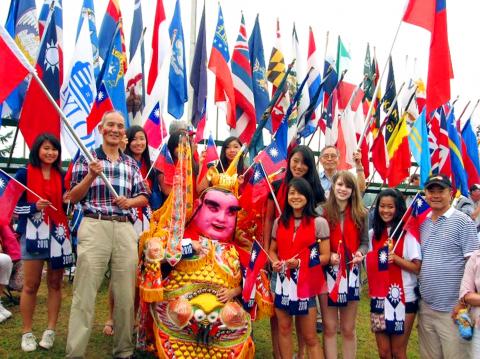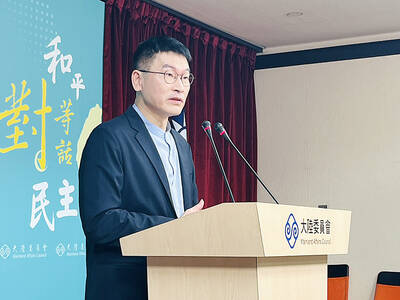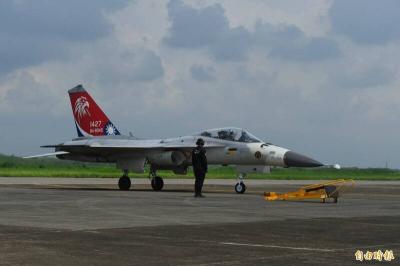A Taiwanese religious folk icon, the Third Prince (三太子哪吒), who can be seen at temple festivals and street parades, has become a trailblazing figure in promoting the nation internationally.
Known as a divine prince with a playful and rebellious spirit, the Taoist deity has in recent years been modernized as the “Techno-Dancing Third Prince” (電音三太子) to provide exuberant entertainment at cultural events in Taiwan and overseas.
Chen Yung-feng (陳永豐), section head for the government liaison office of the Overseas Chinese Affairs Council, introduced the Techno-Dancing Third Prince to Chicago in the US in 2010 at the Chicago Spring Festival Parade while he was the head of the overseas education center in the city.

Photo provided courtesey of Chen Yung-feng, former director of the Culture Center of the Taipei Economic and Cultural Office in Chicago
“It has always been part of Taiwan’s folk culture for deities to go on a walk-about to protect local residents. So it was quite suitable to bring these deities to the street parade,” Chen said.
He checked the Internet for more information and ordered a set of Third Prince costumes from a manufacturer in Taiwan. Chen also ordered custom-made banners, with the traditional stylized emblems, and added the words “Chicago” and “Taiwan touch your heart” in Chinese and English.
He then got volunteers to learn the moves of the Techno-Dancing Third Prince by watching a YouTube video. A Taiwanese folk dance teacher was also hired to help choreograph the dance, Chen said.
“Compared with traditional lion and dragon dances, it is easier to learn the Third Prince’s dance moves and the music is more lively. It is also a suitable dance to go with the big international hit Gangnam Style. The dancing can cause excitement in the crowd,” he said.
Head of the Taipei Economic and Cultural Office in Chicago at the time, Shen Pai-huang (申佩璜), has a vivid memory of the parade.
“The Third Prince immediately became one of the focal points for spectators during the 2010 Chicago Spring Festival Parade,” Shen said.
“Many Americans crowded round to get their pictures taken with the icon,” said Shen, who now heads the Department of Treaty and Legal Affairs at the Ministry of Foreign Affairs.
Shen praised Chen’s idea as innovative and daring, adding: “Now the costume has been put on exhibition and it is taken out for use at special events.”
To date, the Overseas Chinese Affairs Council said that it has sent 96 Third Prince costumes to a number of countries and the Taiwanese religious folk icon can now be seen in South Africa, Guatemala and Thailand, among other nations.
The Techno-Dancing Third Prince first garnered the international spotlight five years ago at the opening ceremony of the 2009 World Games in Kaohsiung. About 20 costumed Third Prince mascots rode motorcycles and romped around the stadium, dancing to entertain the spectators.
From that point on, performances at events have been much in demand and it has unexpectedly turned into a popular representation of Taiwanese culture abroad.
Taiwanese studying overseas have started Techno-Dancing Third Prince troupes and one such group has performed at Dodgers Stadium in Los Angeles. Some students have also taken the costume and performed on their travels abroad.
“The Techno-Dancing Third Prince is becoming a ‘basic must-have’ for Taiwanese overseas communities,” Chen said. “He is very popular because he comes across as a jovial and vivacious character with spirited dancing steps, and has distinct Taiwanese characteristics. The Third Prince successfully combines Taiwanese temple culture and techno music, so it is both traditional and modern. I am happy that the playful and energetic Third Prince has had the opportunity to go around the world and help on the diplomatic front to raise Taiwan’s international profile.”

LOW RISK: Most nations do not extradite people accused of political crimes, and the UN says extradition can only happen if the act is a crime in both countries, an official said China yesterday issued wanted notices for two Taiwanese influencers, accusing them of committing “separatist acts” by criticizing Beijing, amid broadening concerns over China’s state-directed transnational repression. The Quanzhou Public Security Bureau in a notice posted online said police are offering a reward of up to 25,000 yuan (US$3,523) for information that could contribute to the investigation or apprehension of pro-Taiwanese independence YouTuber Wen Tzu-yu (溫子渝),who is known as Pa Chiung (八炯) online, and rapper Chen Po-yuan (陳柏源). Wen and Chen are suspected of spreading content that supported secession from China, slandered Chinese policies that benefit Taiwanese and discrimination against Chinese spouses of

PROMOTION: Travelers who want a free stopover must book their flights with designated travel agents, such as Lion Travel, Holiday Tours, Cola Tour and Life Tours Air Canada yesterday said it is offering Taiwanese travelers who are headed to North America free stopovers if they transit though airports in Japan and South Korea. The promotion was launched in response to a potential rise in demand for flights to North America in June and July next year, when the US, Canada and Mexico are scheduled to jointly host the FIFA World Cup, Air Canada said. Air Canada offers services to 13 of the 16 host cities of the tournament’s soccer games, including Toronto and Vancouver; Mexico City, Guadalajara and Monterrey in Mexico; Atlanta, Georgia; Boston; Dallas; Houston;

The US approved the possible sale to Taiwan of fighter jet spare and repair parts for US$330 million, the Pentagon said late yesterday, marking the first such potential transaction since US President Donald Trump took office in January. "The proposed sale will improve the recipient's capability to meet current and future threats by maintaining the operational readiness of the recipient's fleet of F-16, C-130," and other aircraft, the Pentagon said in a statement. Trump previously said that Chinese President Xi Jinping (習近平) has told him he would not invade Taiwan while the Republican leader is in office. The announcement of the possible arms

ALIGNED THINKING: Taiwan and Japan have a mutual interest in trade, culture and engineering, and can work together for stability, Cho Jung-tai said Taiwan and Japan are two like-minded countries willing to work together to form a “safety barrier” in the Indo-Pacific region, Premier Cho Jung-tai (卓榮泰) yesterday said at the opening ceremony of the 35th Taiwan-Japan Modern Engineering and Technology Symposium in Taipei. Taiwan and Japan are close geographically and closer emotionally, he added. Citing the overflowing of a barrier lake in the Mataian River (馬太鞍溪) in September, Cho said the submersible water level sensors given by Japan during the disaster helped Taiwan monitor the lake’s water levels more accurately. Japan also provided a lot of vaccines early in the outbreak of the COVID-19 pandemic,